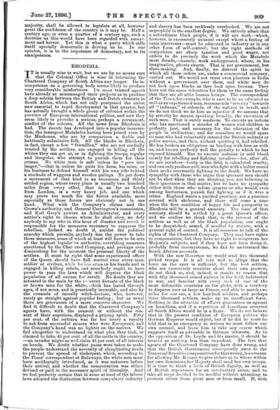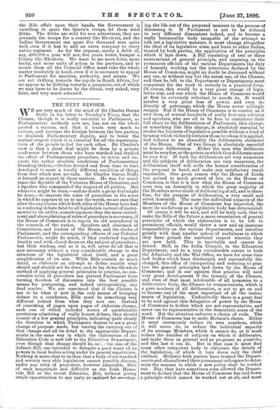RHODESIA.
TT is usually wise to wait, but we are by no-means sure 1 that the Colonial Office is wise in tolerating the Chartered Company of South Africa any longer. Its in- competence as a governing body seems likely to produce very considerable misfortunes. Its most trusted agents have already so mismanaged their projects as to produce a, deep schism between the British and Dutch elements in South Africa, which has not only postponed the union now essential to rapid development in that quarter, but has actually brought a whole group of colonies within the purview of European international politics, and now they seem likely to provoke a serious, perhaps a permanent, conflict of the colours. All the news from Rhodesia is bad. The emeute has developed into a popular insurrec- tion, the insurgent Matabeles having been joined even by the Mashonas, who are by comparison a feeble and habitually submissive folk. All the blacks in Rhodesia, in fact, except a few " friendlies," who arc not cordially trusted by the settlers, are engaged in killing all the whites they can get at, or in fighting the troops, regular and irregular, who attempt to punish them for their crimes. No white man is safe unless he " goes into laager,"—that is, unless he quits his farm, his mine, or his business to defend himself with his own rifle behind a stockade of waggons and wooden palings. To put down a movement of that kind in an enormous and thinly settled region, where every place is usually two hundred miles from every other, that is, as far as Leeds from London, is a very heavy job, and one which may prove too much for the forces available, more especially as those forces are obviously not in one hand. What with the Company's claims and the Crown's authority, and General Carrington's commission, and Earl Grey's powers as Administrator, and every settler's right to choose whom he shall obey, we defy anybody to say who in this hour of disaster and revolt is responsible for the measures necessary to suppress the rebellion. Indeed we doubt if, amidst the political anarchy which prevails, anybody has the power to take those measures, some of which at least will have to be acts of the highest legislative authority, overriding measures sanctioned by the Chartered Company, and perhaps even diminishing for the moment the personal liberty of the settlers. It must be right that some experienced officer of the Queen should have full control over every man, soldier or civilian, while he lias arms in his hands and is engaged in killing rebels, and somebody ought to have power to pass the laws which will deprive the black population of all excuse for revolt. No doubt they are actuated in the main by the i".'erent distaste of the black or brown man for the white, ../hich has lasted through ages, if not eons, and is practically incurable, and also by the counsels of rascally witch-doctors, who, however, rarely go straight against popular feeling ; but as usual there are grievances of a more concrete character. We find it difficult to doubt that the Chartered Company's agents have, with the consent or without the con- sent of their superiors, displayed a griping spirit. Fifty per cent. of the outturn was far too heavy a royalty to ask from successful miners who were Europeans, and the Company's hand was no lighter on the natives. We fail altogether to understand on what plea they took, or claimed to take, 45 per cent. of all the cattle in the country, —an invader might as well claim 45 per cent. of all interest on bonds. We doubt whether pains were taken to make the people understand the necessity of slaughtering herds to prevent the spread of rinderpest, which, according to the Times' correspondent at Bulawayo, the white men must have accidentally introduced, as it was unknown before their arrival, and whether the compensation was either devised or paid in the necessary spirit of liberality. And we feel perfectly certain that in some at least of the labour laws adopted the distinction between compulsory industry and slavery has been recklessly overlooked. We are not negrophile in the smallest degree. We entirely admit that a subordinate black people, if it will not work—which, however, is excessively unusual except where a feeling of caste intervenes—must be educated in industry as in any other form of self-control ; but the right methods of compulsion are sharp taxation and good wages, not orders to do precisely the work which the Matabele most dreads,—namely, work underground, where, in hie imagination, ghosts swarm. That is not government, but slave-making. And, finally, we distrust the spirit in. which all these orders are, under a commercial company,. carried out. We would not trust even planters in India without a government over them, and white men do. not look upon blacks as they look upon browns. They have not the same toleration for them or the same feeling. that they are all alike human beings. The correspondent of the Times, for example, who is sure to be an educated as well as an experienced man, recommends " severity " towards all "indunas,"' or colonels, of the natives in revolt, and% we do not think we do him an injustice if we assume that by severity he means, speaking broadly, the execution of • such men. That is surely madness. To execute an indult& who has sanctioned a murder of women and children is-, perfectly just, and necessary for the education of the people in civilisation ; and for ourselves we would spare no man who had voluntarily entered the British military or police service, and then, without quitting it, had rebelled. He has broken an obligation as binding with him as with • us, and knows perfectly well the penalty to which he has exposed himself. But to execute indunas in cold blood merely for rebelling and fighting invaders—for, after all, we are invaders—fairly in the field, is calculated cruelty. and can only produce evil, men who fight with a halter round their necks necessarily fighting to the death. We have no sympathy with those who argue that ignorant men should not be shot when they are shooting you, not believing in their ignorance in that matter, but we have no sympathy either with those who refuse quarter or who would, even among barbarians, punish fair fighting as if it were a. crime. England wants a pacified province, not a province covered with skeletons, and there will come a time when the first condition of happy life and prosperity in Rhodesia will be a general amnesty. The time of that amnesty should be settled by a great Queen's officer, and we confess we think that, in the interest of the settlers as well as of the black population, one ought to be despatched, armed, if needful by statute, with a. general right of control. It is all nonsense to talk of the - rights of the Chartered Company. They may have rights • to compensation, but they have no right to misgovern her Majesty's subjects, and if they have not been doing it, probably from incompetence, we fail to understand the South African accounts.
With the new Governor we would send five thousand picked troops. It is all very well to allege that the • force on the spot is sufficient, but the best settlers, . who are excessively sensitive about their own prowess, do not think so, and, indeed, it stands to reason that with fifty thousand armed natives in the field, habituated to war, and familiar with every inch of one of the most defensible countries on the globe, with a territory to disperse over as large as France, and able to march two miles for our one, a few hundred soldiers, and perhaps three thousand settlers, make up an insufficient force. Nothing in the situation of affairs guarantees us against an Isandlana, and if a repetition of Isandlana occurred all South Africa would be in a flame. We do not believe- that in the present condition of European politics the- German Emperor would object, but if he did he must be told that in an emergency so serious we must follow our own counsel, and leave him to take any course which suggests itself as advisable in German interests. As to, the opposition of Dr. Leyds and his master, it should be treated as nothing less than impudent. The fact that agents of the Chartered Company have done wrong, and that the British Government consequently owes to the Transvaal Republiccom pensation for that wron g, is no reason for allowing Mr. Kruger to give orders as to where within her own dominions her Majesty shall send her own troops. It is time to think a little of British dignity, as well as of British repentance for an involuntary crime, and to- take all steps decided to be needful without attending to. protests either from great men or from small. If, with, - the Nile affair upon their hands, the Government is unwilling to spare the Queen's troops, let them send Sikhs. The Sikhs are wild for new adventures, they are precisely the troops for a country like Rhodesia, and the Indian Government can spare five thousand men quite well, even if it has to add an extra company to every native regiment. As for the expense, surely a debit of, say, £60,000 a year will not, five years hence, hamper a Colony like Rhodesia. We want to see more force, more lenity, and more unity of action in the province, and to secure them all the Colonial Office must take the whole matter resolutely in hand, even if it is necessary to appeal to Parliament for sanction, authority, and means. We are not drifting towards the rapids in South Africa, but we appear to be drifting towards a quagmire, out of which we may have to be drawn by the throat, very naked, very faint, and very much ashamed.

















































 Previous page
Previous page